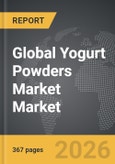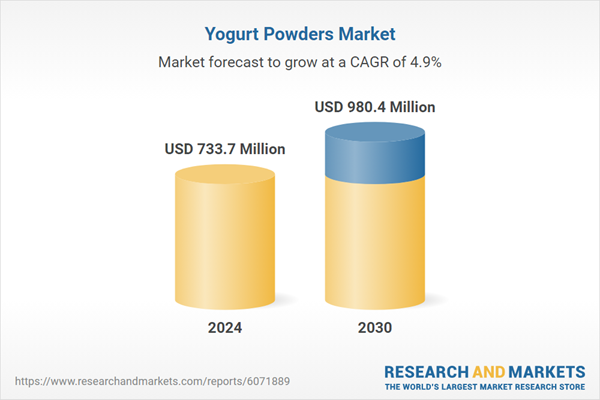Global Yogurt Powder Market - Key Trends & Drivers Summarized
Why Is Yogurt Powder Gaining Popularity? Understanding Its Versatility and Nutritional Benefits
The global yogurt powder market is experiencing rapid growth as food manufacturers, health-conscious consumers, and the functional food industry recognize its versatility and nutritional benefits. Unlike traditional yogurt, which has a limited shelf life and requires refrigeration, yogurt powder offers an extended storage duration and ease of transportation, making it a preferred ingredient in various food applications. It is widely used in the production of dairy-based beverages, bakery items, salad dressings, dips, and nutritional supplements due to its high protein and probiotic content. The growing demand for protein-rich and gut-friendly foods has further driven its adoption, particularly among health-conscious consumers looking for convenient ways to incorporate probiotics into their diet. Additionally, yogurt powder serves as a dairy alternative in plant-based and lactose-free formulations, appealing to the rising number of consumers with dietary restrictions. With the functional food sector expanding, yogurt powder continues to be a key ingredient in product innovation and market expansion.How Is Technology Enhancing Yogurt Powder Production? Exploring Processing Advancements
Technological advancements in food processing have significantly improved the quality and application of yogurt powder. Freeze-drying and spray-drying techniques have enabled the preservation of beneficial probiotics while extending shelf life, ensuring that yogurt powder retains its nutritional properties. Microencapsulation technology has further enhanced the stability of probiotics in yogurt powder, allowing manufacturers to incorporate live cultures into shelf-stable products without compromising efficacy. Additionally, advancements in flavor enhancement and texture modification have improved the sensory experience of yogurt powder-based formulations, making them more appealing to consumers. The introduction of organic and clean-label yogurt powders, free from artificial additives, has also contributed to market growth, as consumers increasingly prioritize natural and minimally processed foods. As research continues to refine production methods, yogurt powder is expected to become an even more valuable ingredient in food product development.What Are the Market Challenges for Yogurt Powder? Identifying Barriers to Growth
Despite its growing demand, the yogurt powder market faces several challenges, including fluctuating raw material costs, competition from fresh dairy alternatives, and probiotic viability concerns. The cost of high-quality dairy inputs, particularly organic milk, directly impacts yogurt powder pricing, making it less accessible in price-sensitive markets. Additionally, while yogurt powder offers convenience, many consumers still prefer fresh yogurt due to its perceived higher probiotic efficacy and natural taste. Another challenge is maintaining probiotic viability during processing and storage, as certain drying methods can reduce the effectiveness of live bacteria. Furthermore, regulatory restrictions on labeling probiotic claims present hurdles for manufacturers seeking to market yogurt powder as a functional food ingredient. To overcome these challenges, companies must focus on research and development to enhance probiotic stability, invest in sustainable sourcing, and educate consumers on the benefits of yogurt powder over traditional dairy products.What's Driving the Growth of the Yogurt Powder Market? Exploring Key Expansion Factors
The growth in the yogurt powder market is driven by several factors, including the rising demand for shelf-stable dairy products, the expansion of the functional food industry, and increasing health-conscious consumer behavior. The food industry's shift toward convenience and long-lasting ingredients has positioned yogurt powder as an essential component in ready-to-eat meals, protein bars, and nutritional supplements. The growing awareness of gut health and the role of probiotics in digestive well-being has also fueled demand for yogurt powder as a source of beneficial bacteria. Additionally, the expansion of e-commerce and direct-to-consumer sales channels has improved accessibility, enabling consumers to purchase yogurt powder for home use in baking, cooking, and smoothies. The increasing popularity of plant-based and dairy-alternative products has led manufacturers to explore innovative yogurt powder formulations that cater to vegan and lactose-intolerant consumers. With continued advancements in food science and growing consumer interest in functional nutrition, the yogurt powder market is expected to witness sustained growth, offering new opportunities for product diversification and market expansion.Report Scope
The report analyzes the Yogurt Powders market, presented in terms of market value (US$). The analysis covers the key segments and geographic regions outlined below:- Segments: Product (Whole Yogurt Powder, Skimmed Yogurt Powder, Semi-Skimmed Yogurt Powder); Packaging (Sachets / Pouches, Cans / Jars, Bulk Packaging); End-Use (Hotel / Restaurant / Cafe, Industrial, Household).
- Geographic Regions/Countries: World; United States; Canada; Japan; China; Europe (France; Germany; Italy; United Kingdom; Spain; Russia; and Rest of Europe); Asia-Pacific (Australia; India; South Korea; and Rest of Asia-Pacific); Latin America (Argentina; Brazil; Mexico; and Rest of Latin America); Middle East (Iran; Israel; Saudi Arabia; United Arab Emirates; and Rest of Middle East); and Africa.
Some of the 34 companies featured in this Yogurt Powders market report include -
- All American Foods, Inc.
- American International Foods Inc.
- Commercial Creamery Company
- EPI Ingredients
- Grande Cheese Company
- Kerry Group Plc
- Osage Food Products
- Prolactal GmbH
- Sweet Pomona GROUP PTY LTD
- Zaklad Produkcyjny Bempresa Sp. z o.o.
Key Insights:
- Market Growth: Understand the significant growth trajectory of the Whole Yogurt Powder segment, which is expected to reach US$518.8 Million by 2030 with a CAGR of a 3.9%. The Skimmed Yogurt Powder segment is also set to grow at 6.5% CAGR over the analysis period.
- Regional Analysis: Gain insights into the U.S. market, valued at $199.9 Million in 2024, and China, forecasted to grow at an impressive 7.7% CAGR to reach $192 Million by 2030. Discover growth trends in other key regions, including Japan, Canada, Germany, and the Asia-Pacific.
Why You Should Buy This Report:
- Detailed Market Analysis: Access a thorough analysis of the Global Yogurt Powders Market, covering all major geographic regions and market segments.
- Competitive Insights: Get an overview of the competitive landscape, including the market presence of major players across different geographies.
- Future Trends and Drivers: Understand the key trends and drivers shaping the future of the Global Yogurt Powders Market.
- Actionable Insights: Benefit from actionable insights that can help you identify new revenue opportunities and make strategic business decisions.
Key Questions Answered:
- How is the Global Yogurt Powders Market expected to evolve by 2030?
- What are the main drivers and restraints affecting the market?
- Which market segments will grow the most over the forecast period?
- How will market shares for different regions and segments change by 2030?
- Who are the leading players in the market, and what are their prospects?
Report Features:
- Comprehensive Market Data: Independent analysis of annual sales and market forecasts in US$ Million from 2024 to 2030.
- In-Depth Regional Analysis: Detailed insights into key markets, including the U.S., China, Japan, Canada, Europe, Asia-Pacific, Latin America, Middle East, and Africa.
- Company Profiles: Coverage of players such as BookRetreats, Drishti Journeys, EAT PRAY MOVE, International Yoga, One Yoga Global and more.
- Complimentary Updates: Receive free report updates for one year to keep you informed of the latest market developments.
Select Competitors (Total 34 Featured):
- All American Foods, Inc.
- American International Foods Inc.
- Commercial Creamery Company
- EPI Ingredients
- Grande Cheese Company
- Kerry Group Plc
- Osage Food Products
- Prolactal GmbH
- Sweet Pomona GROUP PTY LTD
- Zaklad Produkcyjny Bempresa Sp. z o.o.
This edition integrates the latest global trade and economic shifts into comprehensive market analysis. Key updates include:
- Tariff and Trade Impact: Insights into global tariff negotiations across 180+ countries, with analysis of supply chain turbulence, sourcing disruptions, and geographic realignment. Special focus on 2025 as a pivotal year for trade tensions, including updated perspectives on the Trump-era tariffs.
- Adjusted Forecasts and Analytics: Revised global and regional market forecasts through 2030, incorporating tariff effects, economic uncertainty, and structural changes in globalization. Includes historical analysis from 2015 to 2023.
- Strategic Market Dynamics: Evaluation of revised market prospects, regional outlooks, and key economic indicators such as population and urbanization trends.
- Innovation & Technology Trends: Latest developments in product and process innovation, emerging technologies, and key industry drivers shaping the competitive landscape.
- Competitive Intelligence: Updated global market share estimates for 2025, competitive positioning of major players (Strong/Active/Niche/Trivial), and refined focus on leading global brands and core players.
- Expert Insight & Commentary: Strategic analysis from economists, trade experts, and domain specialists to contextualize market shifts and identify emerging opportunities.
Table of Contents
Companies Mentioned (Partial List)
A selection of companies mentioned in this report includes, but is not limited to:
- All American Foods, Inc.
- American International Foods Inc.
- Commercial Creamery Company
- EPI Ingredients
- Grande Cheese Company
- Kerry Group Plc
- Osage Food Products
- Prolactal GmbH
- Sweet Pomona GROUP PTY LTD
- Zaklad Produkcyjny Bempresa Sp. z o.o.
Table Information
| Report Attribute | Details |
|---|---|
| No. of Pages | 367 |
| Published | February 2026 |
| Forecast Period | 2024 - 2030 |
| Estimated Market Value ( USD | $ 733.7 Million |
| Forecasted Market Value ( USD | $ 980.4 Million |
| Compound Annual Growth Rate | 4.9% |
| Regions Covered | Global |









